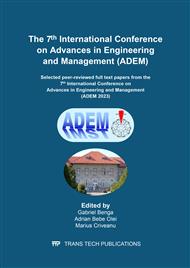[1]
Chernikova O. & et al. "Simulation-Based Learning in Higher Education: A Meta-Analysis", Sage Journals, 10(3), (2020)
Google Scholar
[2]
Jørgen E. & Salman N. "Performance assessment in full-scale simulators - A case of maritime pilotage operations", Journal of Safety Science, 2020.
DOI: 10.1016/j.ssci.2020.104775
Google Scholar
[3]
Sierra J., "The potential of simulations for developing multiple learning outcomes: The student perspective", Elsevier Journal, (2019)
Google Scholar
[4]
Dunn T. & Kennedy M., Technology enhanced learning in higher education; motivations, engagement and academic achievement. Journal of Computers & Education, (2019)
DOI: 10.1016/j.compedu.2019.04.004
Google Scholar
[5]
Vukelic, G. et al. "Application of VR Technology for Maritime Firefighting and Evacuation Training—A Review", Journal of Marine Science and Engineering, 2023.
DOI: 10.3390/jmse11091732
Google Scholar
[6]
Kahakalil M., Lützhöft M. & Scanlan J., "Formative assessment in maritime simulator-based higher education", WMU Journal of Maritime Affairs, (2023)
DOI: 10.1007/s13437-023-00313-6
Google Scholar
[7]
Jamil, M.G., Bhuiyan, Z. "Deep learning elements in maritime simulation programmes: a pedagogical exploration of learner experiences", International Journal of Educational Technology in Higher Education, 2021.
DOI: 10.1186/s41239-021-00255-0
Google Scholar
[8]
Park Y., A study on the standardization of education modules for ARPA/radar simulation, Journal of the Korean Society of Marine Environment & Safety, 2016.
Google Scholar
[9]
Tusher H.M., Nazir S., Ghosh S. & Rusli R. Seeking the Best Practices of Assessment in Maritime Simulator Training, Journal on Marine Navigation and Safety of Sea Transportation, 2023.
DOI: 10.12716/1001.17.01.10
Google Scholar
[10]
Sellberg C. Pedagogical dilemmas in dynamic assessment situations: perspectives on video data from simulator-based competence tests", WMU Journal of Maritime Affairs, (2020)
DOI: 10.1007/s13437-020-00210-2
Google Scholar
[11]
Mehdi Farashahi, Mahdi Tajeddin, "Effectiveness of teaching methods in business education: A comparison study on the learning outcomes of lectures, case studies and simulations", The International Journal of Management Education, (2018)
DOI: 10.1016/j.ijme.2018.01.003
Google Scholar
[12]
Jamil, M. & Isiaq S., Teaching technology with technology: Approaches to bridging learning and teaching gaps in simulation-based programming education", International Journal of Educational Technology in Higher Education, (2019)
DOI: 10.1186/s41239-019-0159-9
Google Scholar
[13]
Karina H. & Salman N., Simulator training for maritime complex tasks: an experimental study", WMU Journal of Maritime Affairs, 2018.
DOI: 10.1007/s13437-017-0133-0
Google Scholar
[14]
Selberg C. "From briefing, through scenario, to debriefing: the maritime instructor's work during simulator-based training", Journal of Cognition, Technology & Work, 2018.
DOI: 10.1007/s10111-017-0446-y
Google Scholar
[15]
Lee, J. et al. "How prior knowledge affects problem-solving performance in a medical simulation game: Using game-logs and eye-tracking", Journal of Computers in Human Behavior, (2019)
DOI: 10.1016/j.chb.2019.05.035
Google Scholar
[16]
Veenstra, A.W., van Meijeren, J., Harmsen, J., Verbraeck, A., Fostering Cooperation in Inland Waterway Networks: A Gaming and Simulation Approach", 2015.
DOI: 10.1007/978-3-319-16133-4_23
Google Scholar
[17]
https://photos.prnasia.com/prnh/20190926/2593024-1-c?lang=0
Google Scholar
[18]
https://www.davincisurgerycommunity.com/Systems_I_A/Skills_Simulator
Google Scholar
[19]
https://www.kongsberg.com/newsandmedia/news-archive/2021/sidmar-upgrade/
Google Scholar


